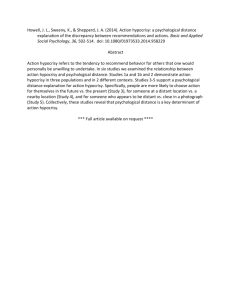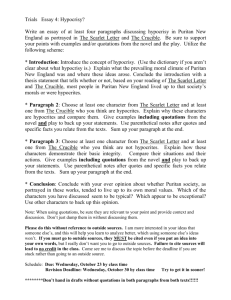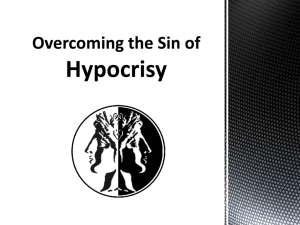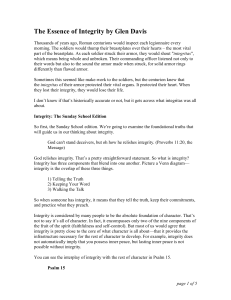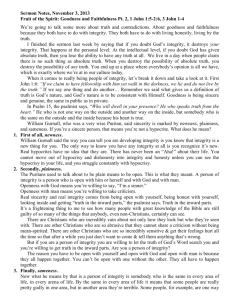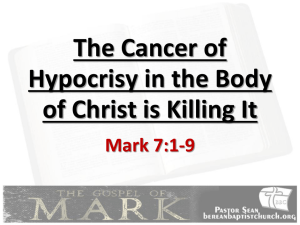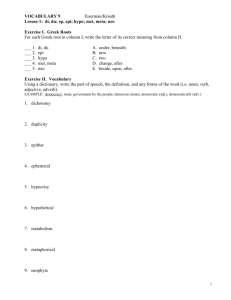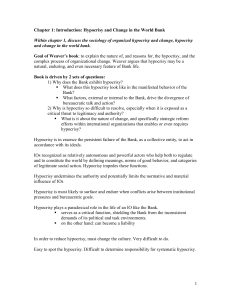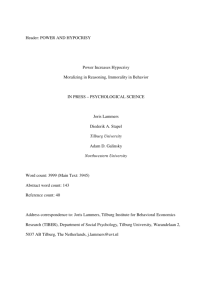Manuscript - The Highland Lodge
advertisement
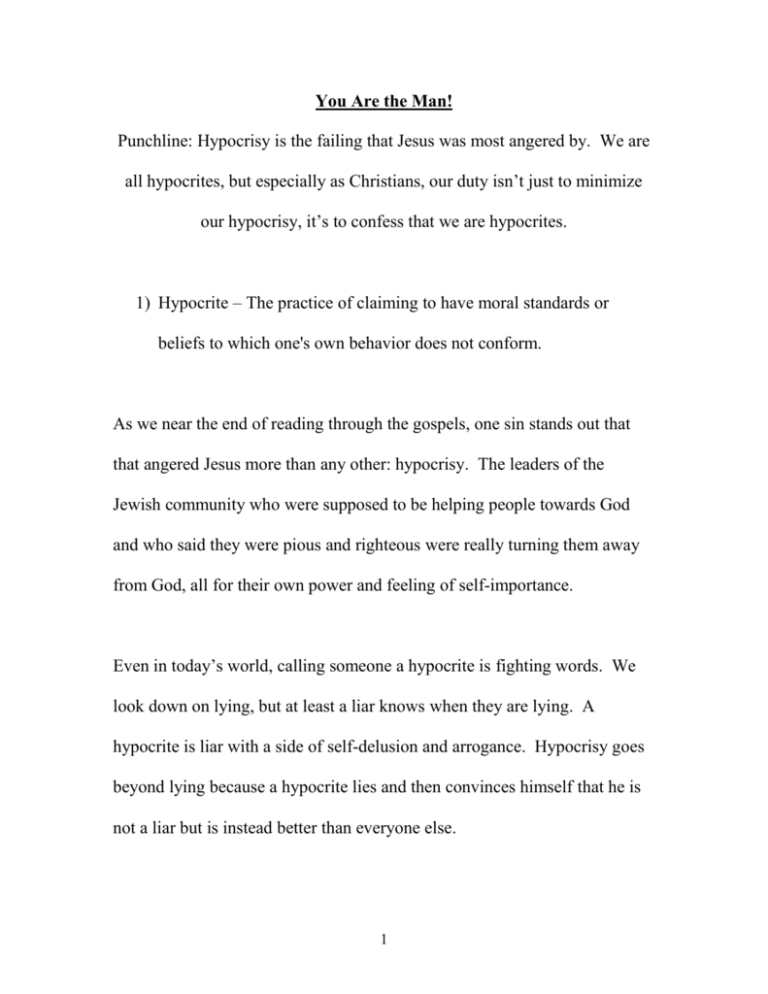
You Are the Man! Punchline: Hypocrisy is the failing that Jesus was most angered by. We are all hypocrites, but especially as Christians, our duty isn’t just to minimize our hypocrisy, it’s to confess that we are hypocrites. 1) Hypocrite – The practice of claiming to have moral standards or beliefs to which one's own behavior does not conform. As we near the end of reading through the gospels, one sin stands out that that angered Jesus more than any other: hypocrisy. The leaders of the Jewish community who were supposed to be helping people towards God and who said they were pious and righteous were really turning them away from God, all for their own power and feeling of self-importance. Even in today’s world, calling someone a hypocrite is fighting words. We look down on lying, but at least a liar knows when they are lying. A hypocrite is liar with a side of self-delusion and arrogance. Hypocrisy goes beyond lying because a hypocrite lies and then convinces himself that he is not a liar but is instead better than everyone else. 1 Unfortunately, if we’re honest about ourselves, we are all hypocrites. We all look down at other people – in the news, in politics, in our churches, and in the world – for doing the very things that we do, maybe to a different degree, but not fundamentally different. From small things: a. Someone cuts you off in traffic, you get mad, and honk at them. Then you accidentally cut someone else off in traffic and feel bad about it, they honk at you and you think, “Man, what a jerk.” b. Complained about someone else being so negative. Or talked with a third party about how so-and-so is a gossip. c. We say everything we have is God’s, but we save it for ourselves and spend it on ourselves instead of sharing it. d. Our country invaded Iraq to establish a democracy and is supporting the democratic rebellion in Libya, because “we want to spread democracy,” but did not support the democratic rebellion in Saudi Arabia. e. We say everyone is welcome in our churches but our denomination is still 90% white when the country is rapidly approaching less than 50% white. 2 f. We proclaim that Jesus walked on water, multiplied loaves, turned water into wine, calmed the storm, raised Lazarus, died himself and was raised, ascended into heaven, and changed the hearts of people like Saul (who wanted to kill Christians)…but when it comes to our enemies, “We have to kill them. They’ll never change.” => Hypocrisy surrounds us – in domestic and international politics, in church, in community life, in families, and even within ourselves. The fact is that hypocrisy is just a part of living in our world…it’s a part of being a human sinner. If we were confronted all at once with the truth of what we are really like, we would go insane. I’m not saying hypocrisy is okay or acceptable, but it is a part of reality. In today’s text, Nathan, the prophet of the time, confronts David, the king, with his hypocrisy. David saw Bathsheba on a roof and desired her for himself. He slept with her and she conceived, so he brought her husband back home to try to get him to sleep with her so he would think the child was his. He refused in order to honor the other troops who were still fighting, so David sends him to the front lines to be killed. 3 Nathan the profit comes and tells David a story about a man who only has one lamb and who loves the lamb, but the rich neighbor who has many flocks takes the lamb and slaughters it to eat. David is furious when he hears this story and says the man should die or at least pay 4 times what he took. And Nathan’s response: “You are the man!” As y’all have probably noticed, I have a million favorite stories from the bible, but this is one of my favorites. Nathan catches David in his hypocrisy and says, “You are the man! You are the king and have wives and riches and power and fame, but you took Uriah’s wife, even though it was all he had, and you sent him to die.” David was furious with the person in the story until Nathan revealed that it was really himself that he was judging, not some other person. And David realizes his hypocrisy and repents. He realizes that he deserves judgment for his actions with Bathsheba and Uriah and he admits, “I have sinned against the Lord.” And God removes the judgment from David. He still has to bear the consequences of his sin – his son is struck with illness and dies, but God forgives David. 4 Part of the lesson in this story is that we should try to avoid hypocrisy as much as possible. But I think a bigger lesson here is our need to confess our hypocrisy. We have to be able to look at other people, whether they are public figures like celebrities or politicians, people we know from work or other the neighborhood, or even our families and be able to see that we are not so different. When we hear news about Arnold Schwarzenegger, it’s easy to condemn his actions but how many of us have failed our marriages – maybe not by sleeping with the maid (though maybe by doing that) – but by checking out into alcohol or drugs, or by escaping into work, or by avoiding with pornography, or even just by not being present. Are we so different? Perhaps we are that man. When we look at reports of Charlie Sheen going literally insane, it’s easy to judge but how many of us have violated our own values and done crazy things to avoid loneliness and depression and then come up with crazy justifications afterwards. Are we so different? Perhaps we are that man. When we see David who sent Uriah to the front line to die in order to cover up his own mistake, it’s easy to shake our heads, but how many of us have gone to great lengths, making things much worse than they originally were, to cover up our tracks instead of admitting our errors. And how many of us have looked with lustful eyes or covetous thoughts at things 5 that we knew were off limits? Are we so different? Perhaps we are that man. Ultimately, we are all hypocrites and we will all continue to be hypocrites. As a leader of the church, I confess that I am the lead hypocrites, because every week I get to stand up here and tell you what God wants us to do with our lives, knowing full well that I do not do it myself. But the great mystery of God’s grace and the great power of the gospel…is that God loves us anyway and uses us anyway. God, in his mercy, claims us as his children and empowers us to share the good news not because we are perfect, not because we do everything we say and say everything we do…but precisely because we do not. By confessing our hypocrisy, by admitting that we do not live up to our own standards, by acknowledging and even proclaiming our imperfection we say to the world that God’s love is not conditional and not contingent on performance, achievement, or accomplishment. By claiming our own sin, we allow other sinners to open themselves to the possibility of grace. God’s love is given freely, not because we deserve it, but in spite of the fact that we don’t deserve it…and that is exactly what makes it so transformative, so radical, and so valuable. 6 Brothers and sisters, we are sinners. And part of our sin, as people living in this broken world, is hypocrisy. When we deny our hypocrisy, when we deny our sin, we deny our need for God’s grace, we deny God the chance to use us to reach sinners, and we proclaim that God only loves people who are already whole. But when we confess and claim our sin, not only are we forgiven and transformed, but we are enabled to proclaim a grace which has transformed and continues to transform our world. So let us claim our hypocrisy. Let us claim our sinfulness. Let us claim our brokenness. Let us not look at other people and think that we are so different from them. Let us realize that we are that man, but that by God’s grace he has claimed us as his own. We are sinners, we are hypocrites, but God loves us and uses us anyway. 7
